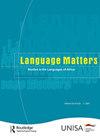Proverbs, Power and Politics: A Linguistic Analysis of Osofisan’s Yungba-Yungba and the Dance Contest
IF 0.8
3区 文学
0 LANGUAGE & LINGUISTICS
引用次数: 1
Abstract
Abstract African writers represent and reflect their cultural and sociolinguistic realities in their writings in spite of the necessity of acceding to the globalising and hegemonic dictates of English. This linguistic hybridisation is asserted through the use of indigenous linguistic practices. This article studies the use of proverbs and its relationship with power and politics in Femi Osofisan's (2012) play Yungba-Yungba and the Dance Contest. While the proverbs, as is customary in Yoruba society, function as conversational lubricants, they reveal diverse pragmatic implications. I identify the nexus of power and politics in proverbs with the contextual functions of mediation, provocation and admonition/caution. Ideologically, the proverbs contribute to the thematic preoccupation of political awakening and document the Yoruba ethos and mores, particularly in the face of language endangerment. More importantly, they assist in indexing a global issue: the recurrent conflict between progressive forces and oppressive regimes.谚语、权力与政治:奥索瓦桑的《云巴云巴》与舞蹈比赛的语言分析
摘要非洲作家在他们的作品中代表和反映了他们的文化和社会语言学现实,尽管他们有必要接受英语的全球化和霸权统治。这种语言混合是通过使用土著语言实践来断言的。本文研究了费米·奥索菲桑(Femi Osofisan,2012)的剧作《容巴容巴与舞蹈大赛》中谚语的使用及其与权力和政治的关系。正如约鲁巴社会的惯例一样,谚语起着会话润滑剂的作用,但它们揭示了不同的语用含义。我认为谚语中的权力和政治关系具有调解、挑衅和告诫/谨慎的语境功能。从意识形态上讲,这些谚语有助于政治觉醒的主题关注,并记录了约鲁巴人的精神和习俗,尤其是在面临语言威胁的情况下。更重要的是,它们有助于索引一个全球性问题:进步力量和压迫政权之间反复发生的冲突。
本文章由计算机程序翻译,如有差异,请以英文原文为准。
求助全文
约1分钟内获得全文
求助全文
来源期刊

Language Matters
Multiple-
CiteScore
1.20
自引率
0.00%
发文量
19
期刊介绍:
The purpose of Language Matters is to provide a journal of international standing with a unique African flavour focusing on multilingualism in Africa. Although the journal contributes to the language debate on all African languages, sub-Saharan Africa and issues related to multilingualism in the southern African context are the journal’s specific domains. The journal seeks to promote the dissemination of ideas, points of view, teaching strategies and research on different aspects of African languages, providing a forum for discussion on the whole spectrum of language usage and debate in Africa. The journal endorses a multidisciplinary approach to the study of language and welcomes contributions not only from sociolinguists, psycholinguists and the like, but also from educationalists, language practitioners, computer analysts, engineers or scholars with a genuine interest in and contribution to the study of language. All contributions are critically reviewed by at least two referees. Although the general focus remains on multilingualism and related issues, one of the three issues of Language Matters published each year is a special thematic edition on Language Politics in Africa. These special issues embrace a wide spectrum of language matters of current relevance in Southern Africa.
 求助内容:
求助内容: 应助结果提醒方式:
应助结果提醒方式:


